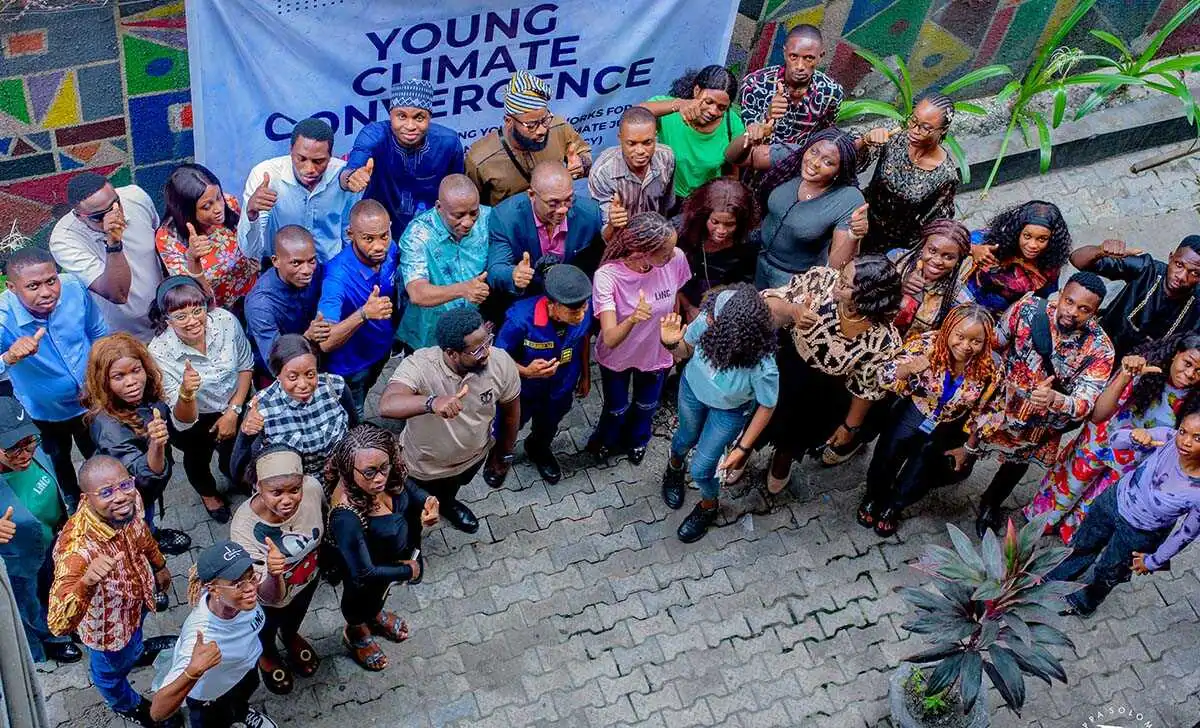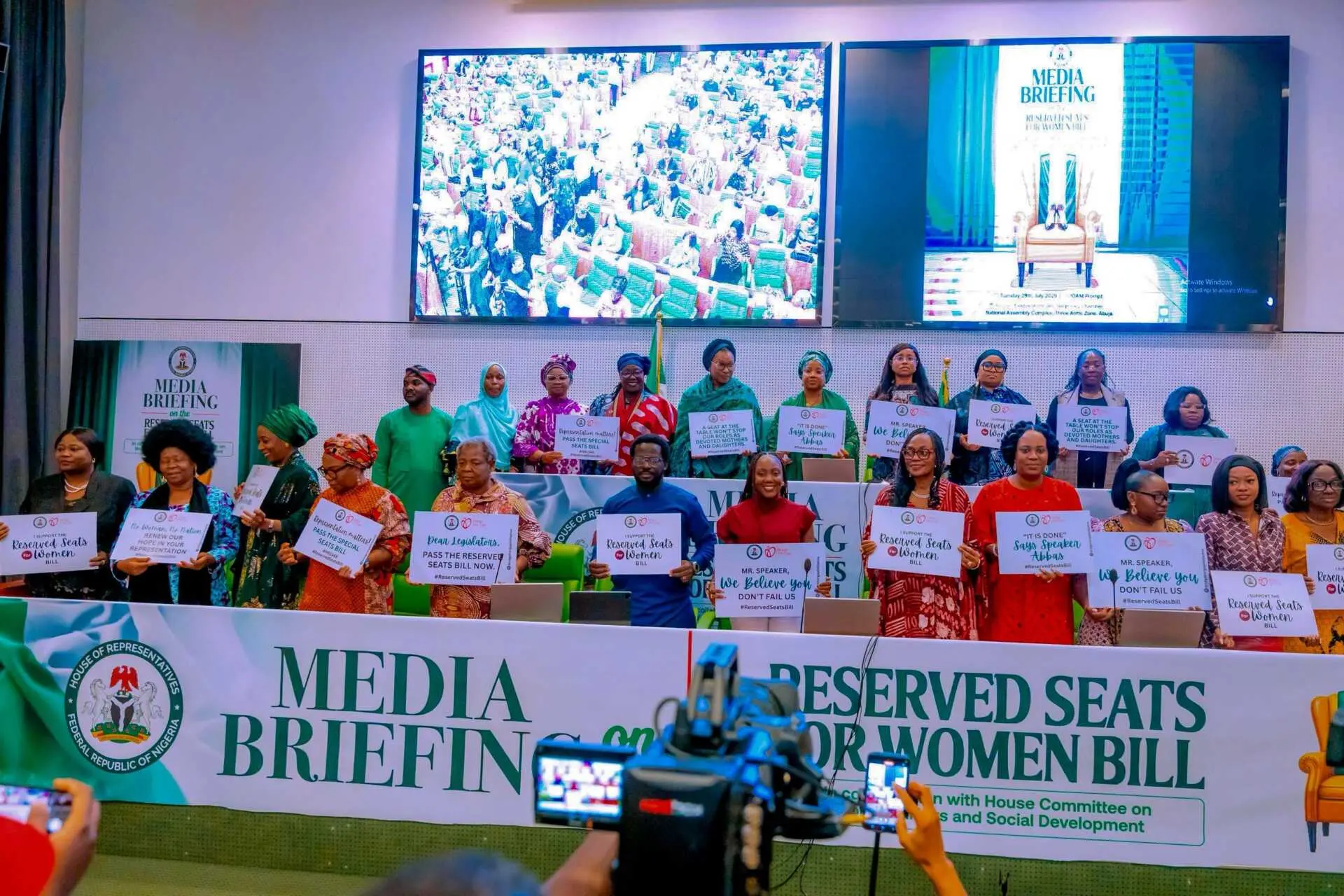- Written by: Tobechukwu Prosper
- September 9, 2025
For decades, women in Nigeria, particularly those in rural and climate-vulnerable communities—have remained excluded from decision-making processes that determine the future of their environments, livelihoods, and bodies. In oil-producing regions like the Niger Delta, where the impacts of climate change, extractive industries, and institutional neglect intersect most violently, women are first to suffer but last to be heard.

NIger Delta Women
It is against this backdrop that House Bill 1349 (HB1349) was introduced in the 10th National Assembly—sponsored by Deputy Speaker Rt. Hon. Benjamin Okezie Kalu (CFR) and driven by Speaker Rt. Hon. Tajudeen Abbas, PhD (GCON). The bill proposes reserved seats for women in both Chambers of the National Assembly and across all State Assemblies to increase women’s legislative representation and improve inclusion in governance.

Hon. Tajudeen Abbas, Speaker, House of Representative , Nigeria. Sharing about the proposed bill

Media Breifing on the Reserved Seats for Women Bill
If passed, the bill will:
- Create 37 additional seats in the House of Representatives
- Add 37 new seats in the Senate
- Establish 108 additional seats across State Houses of Assembly
Women will still contest general seats, but these provisions guarantee a minimum representation baseline—potentially increasing women’s presence in the Senate to 28% and in State Assemblies to nearly 15%. Today, women hold only 3.6% of Senate seats and 4.7% in the House of Representatives, with about 15 states having no female lawmakers at all. This is not just alarming—it places Nigeria at the bottom of the continental ranking for women’s political representation.

Committee members and advocates for the reserved seats bill
Why This Moment Matters
This is not the first time the conversation around women’s reserved seats has emerged. Previous attempts to legislate affirmative action or gender quotas have been dismissed or politicized, often portrayed as “handouts” or undermining meritocracy. But HB1349 is different—not just in content, but in timing, leadership, and strategy.
What sets this moment apart is the deliberate, cross-sectoral mobilization to support the bill. In July 2025, the Office of the Speaker of the House of Representatives convened a Strategic Working Committee of over 41 individuals, including:
Renowned journalist and women’s advocate Toun Okewale-Sonaiya
Grassroots mobilizers, legal experts, and public sector officials
This committee is being led under the coordination of Hon. Kafilat Adetola Ogbara supported by Yeside Olasimbo, the Senior Special Adviser to the Speaker on Women Affairs, a young SDG advocate whose passion reflects a growing recognition that intersectional, youth-driven voices must lead the charge for inclusive governance.
The committee is working closely with the United Nations Development Programme – UNDP to design and implement a strategic advocacy roadmap ,one that focuses not only on lobbying lawmakers, but on mobilizing traditional leaders, faith communities, the media, political parties, and civil society to understand why this bill is not just about gender, but national development.

Inaugurated Committee Members

Diolu Tobechukwu and Committee members
Why HB1349 is Essential for Climate Justice
Climate change does not affect everyone equally. In Nigeria, women in rural and oil-polluted areas carry the burden of environmental degradation, yet they are seldom consulted in adaptation or mitigation strategies. Women are more likely to rely on land and water for livelihoods, more exposed to displacement during floods, and more vulnerable to energy poverty and food insecurity.
In the Niger Delta, where multinational oil companies have operated for decades with minimal accountability, it is women who are left to farm on contaminated soil, raise children in toxic environments, and rebuild communities after each environmental disaster. Yet, their stories rarely make it into parliamentary debates, climate plans, or budget allocations.
More women in Parliament = More community-based policies = More effective climate response.

If passed, HB1349 could provide the political infrastructure for:
- Gender-responsive climate legislation
- Stronger policy pressure on IOCs and polluters
- Accountability on the Petroleum Industry Act (PIA) implementation
- Sustainable resource allocation for rural women and climate-vulnerable groups

Challenges Ahead
Despite the momentum, passing HB1349 will not be easy. Nigeria’s constitutional amendment process requires a two-thirds majority in both Houses and the support of at least 24 State Assemblies. There are cultural, political, and institutional biases that must be confronted—including:
- Misconceptions that reserved seats are “handouts”
- Resistance from power blocs within political parties
- Weak awareness among rural populations who would benefit the most
However, the committee’s strategic plan—supported by United Nations Development Programme – UNDP focuses on targeted lobbying, community sensitization, and mass mobilization. Campaigns will include:
- Town halls and school outreach across Nigeria
- Documentaries and digital storytelling featuring grassroots women
- Faith-based and traditional leadership dialogues
- Public campaigns through radio, social media, roadshows, and school debates
What’s Next
The countdown to October 2025, when the bill is scheduled to be voted on as part of constitutional amendment sessions, has begun. The next 8–10 weeks will be crucial. If HB1349 passes, Nigeria will take a major step toward fulfilling SDG 5 (Gender Equality) and SDG 13 (Climate Action), while aligning with the African Union’s Agenda 2063 and other regional commitments.
But more importantly, millions of women in villages, markets, farms, and classrooms will finally see themselves in the laws that shape their lives.
In Conclusion
This is not about favor. This is about fairness.
It is not about giving power. It is about returning it to where it belongs.
HB1349 must pass—because development without women is not development at all.
Because climate justice without gender equity is incomplete.
And because a nation cannot truly move forward with half its people left behind.




